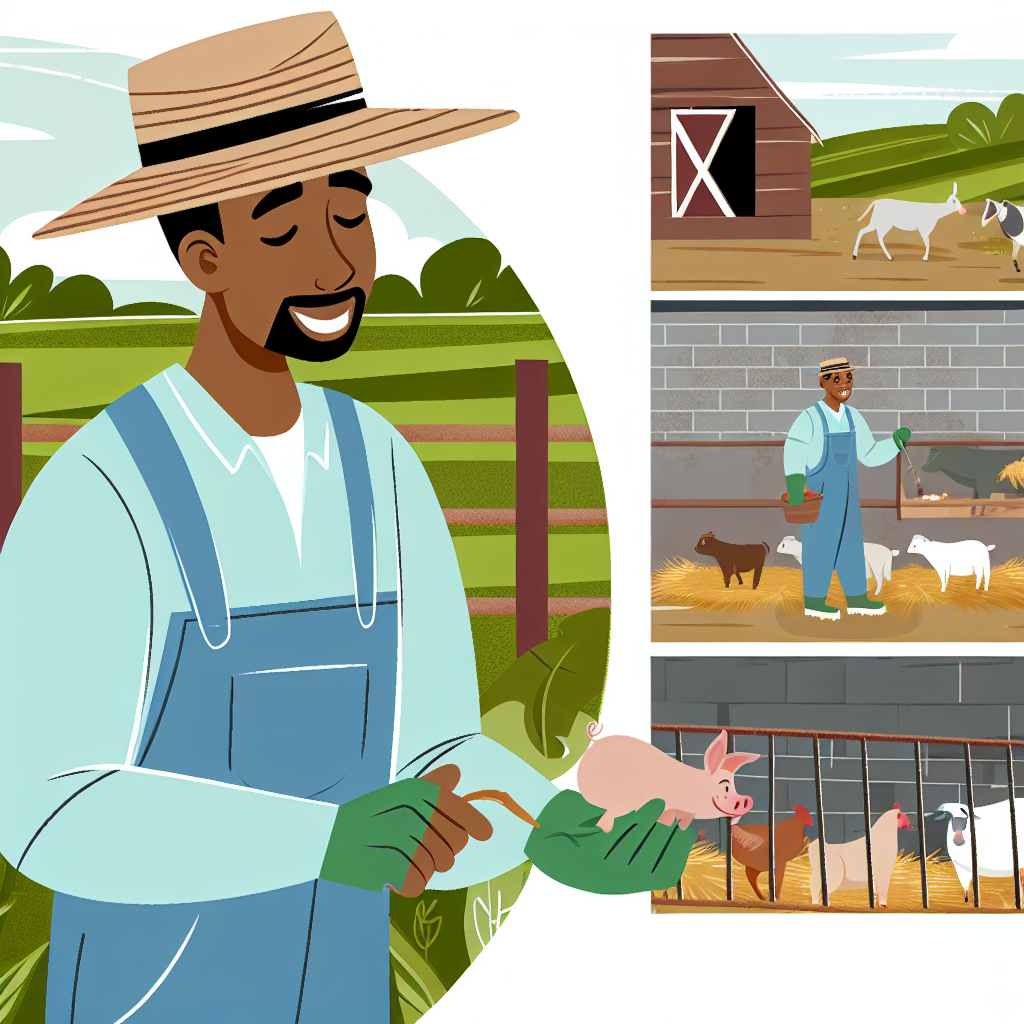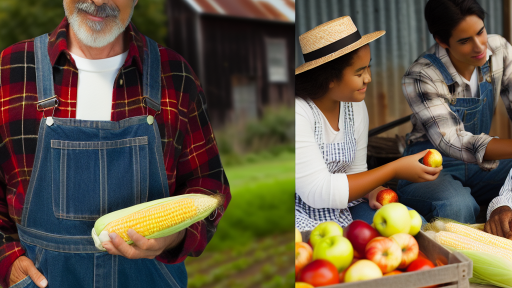Introduction to Humane Farming
Definition of Humane Farming
Humane farming prioritizes the wellbeing of animals.
It focuses on ethical treatment throughout their lives.
This approach contrasts with conventional farming practices.
Importance of Humane Farming
Humane farming enhances animal health and happiness.
Healthy animals produce better quality food.
Additionally, it cultivates consumer trust and loyalty.
Benefits for the Environment
Humane farming often promotes responsible land use.
This practice reduces the need for harmful chemicals.
By enhancing biodiversity, it boosts ecosystem health.
Social and Economic Implications
Humane farming can strengthen local economies.
It often leads to stronger community ties.
Moreover, it supports fair labor practices in agriculture.
Historical Context of Farming Practices and Animal Welfare
Evolving Farming Techniques
Farming has evolved significantly over centuries.
Early practices focused on sustenance and survival.
Farmers relied heavily on traditional methods.
Transform Your Agribusiness
Unlock your farm's potential with expert advice tailored to your needs. Get actionable steps that drive real results.
Get StartedThese methods included rotational grazing and mixed cropping.
As societies advanced, so did farming techniques.
Industrialization introduced mechanization and monoculture.
This shift increased productivity but raised concerns.
Namely, these concerns revolved around animal welfare.
Animal Welfare in Historical Context
Animal welfare awareness emerged in the 19th century.
Philosophers and activists began advocating for better treatment.
Organizations like the Royal Society for the Prevention of Cruelty to Animals formed.
These groups pushed for humane treatment of animals.
Legislation followed to protect animals from cruelty.
Modern Practices and Their Impact
Today, farming practices continue to evolve.
Technological advancements influence animal welfare standards.
Humane farming techniques promote better living conditions.
Consumers increasingly demand ethically sourced products.
As a result, farmers are adopting more sustainable practices.
Challenges and Opportunities
Despite progress, challenges remain in animal welfare.
Intensive farming practices often compromise animal health.
Moreover, economic pressures can hinder humane treatment.
However, there are opportunities for improvement.
Education and advocacy play a critical role in change.
Farmers, consumers, and policymakers must collaborate.
By doing so, they can create a more humane future for agriculture.
Principles of Humane Farming Techniques
Animal Welfare Considerations
Humane farming prioritizes the welfare of all animals involved.
It promotes natural behaviors and reduces stress in livestock.
Showcase Your Farming Business
Publish your professional farming services profile on our blog for a one-time fee of $200 and reach a dedicated audience of farmers and agribusiness owners.
Publish Your ProfileFarmers must provide proper housing and health care for animals.
These measures foster a safe and healthy environment.
Environmental Sustainability
Humane farming also emphasizes sustainable agricultural practices.
This includes minimizing chemical use and preserving natural resources.
Practices like rotational grazing enhance soil health and biodiversity.
Farmers are encouraged to adopt eco-friendly feeding methods.
Ethical Treatment of Workers
Humane farming recognizes the rights of workers on farms.
Fair wages and safe working conditions are essential elements.
Continuous training and development ensure worker competence and satisfaction.
Moreover, fostering a culture of respect benefits both workers and animals.
Community Engagement
Engaging with the local community fosters transparency in farming practices.
Collaborating with consumers builds trust and enhances product value.
Participating in local markets and outreach programs increases awareness.
Farmers can share knowledge and strategies for humane practices.
Transparency and Accountability
Successful humane farming requires clear practices and accountability measures.
Producers should openly share information about farming techniques.
Regular audits and certifications ensure adherence to humane standards.
This transparency builds consumer confidence in humane products.
Explore Further: Maximizing Farm-to-Table with Seasonal Eating
Benefits of Humane Farming for Animals, Farmers, and Consumers
Advantages for Animals
Humane farming prioritizes animal welfare above all else.
This approach reduces stress and suffering among livestock.
In addition, animals can express natural behaviors in humane systems.
Consequently, healthier animals lead to better quality products.
This practice aligns with growing consumer demand for ethical treatment.
Positive Impact on Farmers
Farmers benefit from humane farming techniques in multiple ways.
Better animal health increases productivity and profitability.
Humane practices can enhance a farmer’s reputation in the market.
Additionally, consumer preference is shifting towards ethically sourced products.
Overall, farmers can enjoy improved customer loyalty and trust.
Consumer Benefits
Consumers experience several advantages from humane farming practices.
First, they gain access to higher quality food products.
Humane farming ensures meat, eggs, and dairy are more nutritious.
Moreover, consumers feel more confident in their food choices.
They can support ethical practices with their purchasing decisions.
This fosters a stronger connection between consumers and farmers.
Find Out More: Benefits of Community Supported Agriculture for Farmers
Implementing Sustainable Practices
Crop Rotation
Crop rotation effectively enhances soil health and fertility.
By alternating different crops, farmers can balance nutrient depletion.
This method reduces the risk of pests and diseases significantly.
For example, after planting legumes, farmers can follow with cereals.
Showcase Your Farming Business
Publish your professional farming services profile on our blog for a one-time fee of $200 and reach a dedicated audience of farmers and agribusiness owners.
Publish Your ProfileMoreover, rotation helps avoid soil erosion and compaction.
Establishing a planned rotation schedule ensures optimum yields every season.
Many farmers report increased crop diversity as a direct benefit.
Biodiversity in Farming
Biodiversity plays a crucial role in sustainable agriculture.
It supports a wider variety of crops, which boosts resilience.
Farmers can enhance biodiversity by incorporating cover crops.
This practice improves nutrient cycling and soil structure.
Additionally, diverse planting can attract beneficial insects.
Farmers like Elena Martinez have noted success using this strategy.
By fostering biodiversity, farms become healthier and more productive.
Benefits of Sustainable Practices
Implementing these sustainable practices offers numerous advantages.
They reduce reliance on chemical inputs, promoting environmental health.
This approach enhances food security by increasing crop yields.
Furthermore, sustainable practices improve farm profitability over time.
Ultimately, farmers contribute positively to local ecosystems.
As such, they support community health and well-being.
You Might Also Like: Renewable Energy Integration In Sustainable Farms
Animal Husbandry: Best Practices for Care and Management
Understanding Animal Welfare
Animal welfare is fundamental in humane farming.
Farmers must prioritize the physical and mental well-being of animals.
Consequently, they should create environments that meet animals’ needs.
This includes providing adequate space, shelter, and social interactions.
Nutrition and Feeding Strategies
Proper nutrition is crucial for optimal animal health.
Farmers should select high-quality feed appropriate for each species.
Additionally, they must regularly monitor body conditions.
This ensures each animal receives tailored nutrition.
Health Management Practices
Regular health checks help prevent disease outbreaks.
Farmers should establish vaccination schedules for all animals.
Moreover, they must provide access to veterinary care when needed.
Implementing biosecurity measures reduces disease risks.
Housing Conditions and Environment
The housing environment impacts the overall health of animals.
Farmers should ensure proper ventilation and humidity levels.
Furthermore, maintaining cleanliness helps prevent infections.
Designing enclosures with natural light enhances animal well-being.
Behavioral Management and Enrichment
Understanding animal behavior is vital for humane farming.
Farmers should implement enrichment activities that engage animals.
These activities encourage natural behaviors and reduce stress.
Additionally, social interactions within species promote mental health.
Training and Handling Techniques
Gentle handling techniques build trust with animals.
Farmers should train staff on low-stress handling methods.
Consistent handling routines help animals adapt more easily.
Showcase Your Farming Business
Publish your professional farming services profile on our blog for a one-time fee of $200 and reach a dedicated audience of farmers and agribusiness owners.
Publish Your ProfileConsequently, this leads to a safer environment for both animals and humans.
Discover More: Effective Water Conservation For Sustainable Agriculture

Technology and Innovation in Humane Farming
Introduction to Humane Farming Techniques
Humane farming prioritizes the welfare of animals in agriculture.
Many innovative techniques ensure animals lead better lives.
Technology plays a significant role in these advancements.
Automation in Farm Management
Automation enhances efficiency in farm management.
For instance, robotic milking systems improve dairy farming.
These robots allow for stress-free milking for cows.
Additionally, automated feeding systems ensure proper nutrition.
Farmers can monitor animal health in real time through data analytics.
Precision Agriculture Techniques
Precision agriculture leverages technology for better crop yields.
Drones assist in monitoring crop health from above.
Farmers can analyze data to make informed decisions.
These tools enable targeted interventions, reducing waste.
Moreover, they promote efficient resource use, benefiting the environment.
Research and Development in Animal Welfare
Ongoing research drives innovation in humane practices.
Companies like AgriTech Solutions focus on animal behavior studies.
Such research helps develop better living conditions for livestock.
Innovative housing designs increase comfort and reduce stress.
Furthermore, genetic research contributes to healthier animal breeds.
Consumer Awareness and Demand
Consumer awareness influences farming practices significantly.
As demand for humane products rises, farmers adapt swiftly.
Transparency in sourcing fosters trust between consumers and producers.
Additionally, labels like “humanely raised” appeal to ethical consumers.
Future Trends in Humane Farming
The future promises continued advancements in humane farming techniques.
Emerging technologies will further revolutionize animal care.
For instance, virtual reality training enhances farmer education.
Sustainability will remain at the forefront of future agriculture practices.
Ultimately, humane farming will grow as a significant industry standard.
Challenges and Solutions in Adopting Humane Farming Methods
Understanding the Initial Challenges
Many farmers resist changing to humane farming practices.
They often fear financial losses due to the transition.
Additionally, misinformation about humane techniques is widespread.
Many traditional methods have been ingrained for generations.
Moreover, farmers face a lack of resources for training.
Financial Considerations
Investment is a significant barrier for adopting humane practices.
Initial costs for infrastructure changes can deter farmers.
However, long-term savings can result from humane practices.
Many consumers are willing to pay a premium for humane products.
Consequently, this can lead to higher profit margins.
Education and Training Solutions
Providing accessible training is crucial for farmers.
Showcase Your Farming Business
Publish your professional farming services profile on our blog for a one-time fee of $200 and reach a dedicated audience of farmers and agribusiness owners.
Publish Your ProfileOrganizations can offer workshops and seminars on humane practices.
Sharing successful case studies can motivate hesitant farmers.
Farmers should have access to online resources and mentorship.
Additionally, government programs can support these educational efforts.
Community Support and Collaboration
Building a community around humane farming fosters support.
Local farmers can share experiences and strategies.
Cooperatives can help in resource sharing and financial pooling.
Furthermore, partnerships with humane organizations can provide guidance.
Collaborating with universities can also yield innovative solutions.
Consumer Demand Drives Change
Increasing consumer demand for humane products promotes change.
Consumers can influence the market by choosing humane options.
Education campaigns can inform consumers about humane practices.
As awareness grows, demand for humane products does too.
This can push more farmers to adopt humane techniques.
Legislative and Policy Support
Governments can play a significant role in promoting humane farming.
Implementing policies that support humane practices can be effective.
Subsidies for humane certifications can encourage adoption.
Regulatory frameworks can help set humane standards across the industry.
Supportive policies create a more conducive environment for humane farming.
Case Studies of Successful Humane Farming Initiatives
Farm Sanctuary’s Approach
Farm Sanctuary prioritizes animal welfare in all operations.
They provide lifelong care for rescued farm animals.
This organization educates the public about humane farming.
Their model promotes compassion towards these animals.
Farm Sanctuary’s farms operate as humane educational centers.
Visitors learn about the importance of humane treatment.
The Rodale Institute Model
The Rodale Institute focuses on organic, regenerative farming practices.
This organization emphasizes soil health and animal welfare.
They utilize animals as part of their ecological system.
This balance supports both biodiversity and sustainable practices.
Rodale Institute offers training for farmers transitioning to humane methods.
They advocate for practices that benefit both animals and land.
Chapel Hill Farm’s Community Impact
Chapel Hill Farm employs permaculture principles in their farming.
This approach creates a sustainable ecosystem for livestock.
Farmers in the area participate in cooperative practices.
Community engagement encourages transparency in farming methods.
Chapel Hill provides direct-to-consumer sales, ensuring animal care.
They demonstrate successful community-supported agriculture models.
Wholesome Wave’s Education Programs
Wholesome Wave offers programs to promote local humane farms.
They educate consumers on the benefits of humane farming.
This organization creates marketplaces for humane products.
Showcase Your Farming Business
Publish your professional farming services profile on our blog for a one-time fee of $200 and reach a dedicated audience of farmers and agribusiness owners.
Publish Your ProfileThey strive to make humane food accessible to all communities.
Wholesome Wave partners with local farmers for effective outreach.
Their advocacy fosters greater awareness of humane practices.
Future Trends: The Evolution of Humane Farming Practices
Technological Innovations
The rise of technology is transforming humane farming practices.
Advancements in automation improve efficiency on farms.
These technologies help reduce labor costs and human error.
Moreover, precision farming ensures animals receive optimal care.
Consumer Expectations
Consumers are increasingly demanding humane treatment of animals.
This shift influences producers to adopt better practices.
As awareness grows, transparency in sourcing becomes crucial.
Brands that highlight their humane practices attract more customers.
Regulatory Changes
Government regulations are evolving to support humane farming.
New laws promote animal welfare standards on farms.
Compliance with these standards drives industry-wide changes.
Consequently, producers must adapt to remain competitive.
Integrating Sustainability
The connection between humane farming and sustainability grows clearer.
Sustainable practices benefit both animal welfare and the environment.
Farmers increasingly embrace agroecological principles.
This integration fosters healthy ecosystems and resilient agriculture.
Education and Awareness Campaigns
Educational initiatives are promoting humane farming principles.
Training programs for farmers improve humane methods.
Additionally, awareness campaigns inform consumers about these practices.
Informed consumers can make better choices regarding food purchases.
Additional Resources
The Omnivore’s Delusion: Against the Agri-intellectuals | American …




